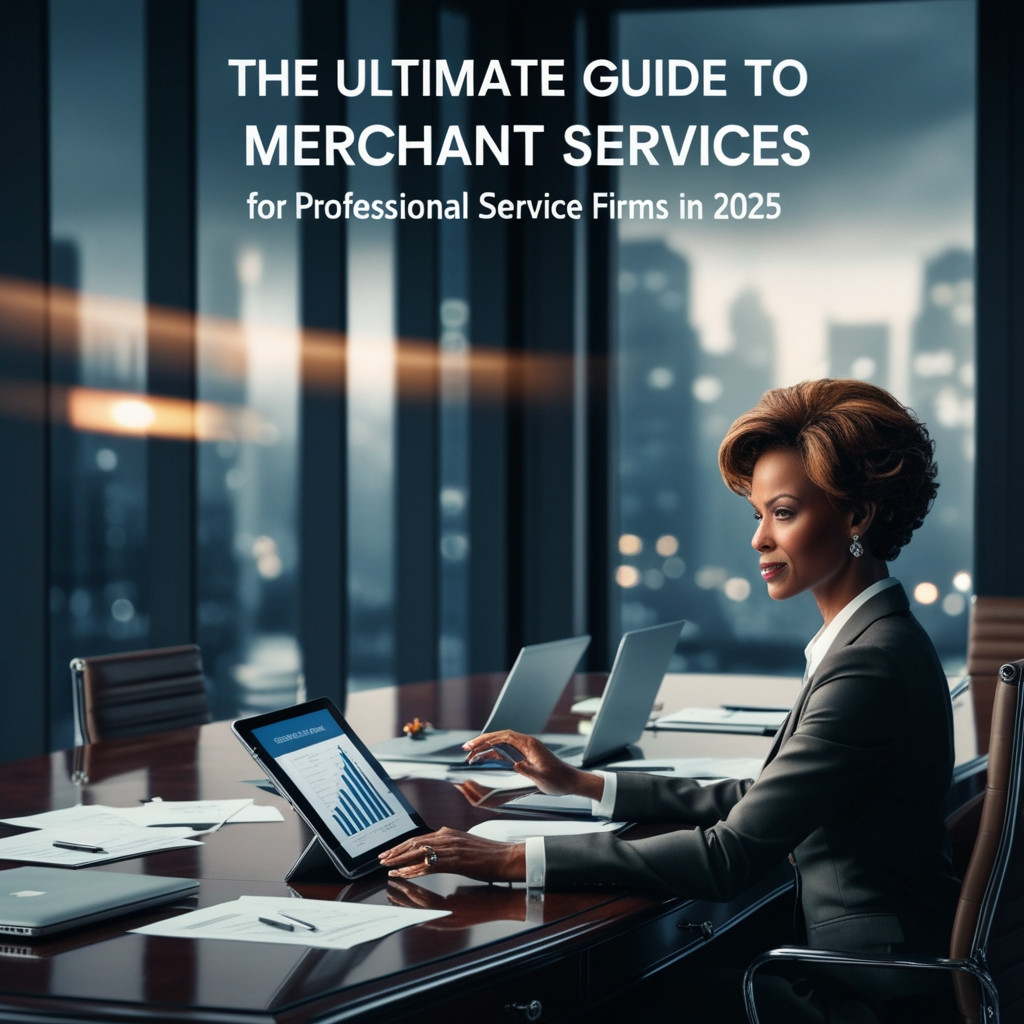The Ultimate Guide to Merchant Services for Professional Service Firms in 2025

As professional services continue to digitize client interactions and streamline billing, the need for specialized merchant services is more pressing than ever. Law firms, accounting practices, insurance agents, and bookkeepers all require secure, flexible, and compliant payment solutions that are tailored to their specific workflows. But not all merchant accounts are created equal.
This guide breaks down the merchant service needs of different professional sectors, highlights the risk classification challenges they face, and outlines how to secure the most suitable solution, whether you're seeking a lower-risk merchant account or navigating high-risk status.
Why Merchant Services Matter for Professional Services
Unlike traditional retailers, professional service firms often deal with:
- High-value or recurring payments
- Retainer-based billing
- Regulatory oversight (e.g., IOLTA accounts, insurance compliance)
- Long invoicing cycles
These characteristics require far more than a plug-and-play payment processor. Instead, service providers need purpose-built platforms offering robust support, integration, and risk mitigation.
Tailored Solutions by Industry
1. Merchant for Accounting Firms
Accounting firms manage audits, tax filing, and financial consultations—often under recurring billing or milestone-based contracts. An ideal merchant for accounting firms should provide:
- Seamless integration with accounting platforms (QuickBooks, Xero, etc.)
- Recurring and installment billing
- PCI-compliant payment handling
- Custom invoicing and reporting tools
These features ensure accountants minimize late payments and maintain financial compliance while optimizing internal workflows.
2. Merchant for Bookkeeping Services
Bookkeepers typically operate on monthly retainer models, managing general ledgers, payroll, and transaction reconciliations. The right merchant for bookkeeping services must support:
- Automated recurring billing
- ACH transfers and credit card payments
- Branded client payment portals
- Low-fee processing for frequent transactions
Because bookkeeping often involves smaller but frequent transactions, it's easier to qualify for a lower risk merchant service for professional services if you maintain clean documentation and low dispute rates.
3. Merchant Service for Attorneys
Legal professionals face unique trust account regulations, particularly when handling retainers or settlement funds. A merchant service for attorneys must:
- Comply with IOLTA and state bar trust account requirements
- Segregate operating and trust funds
- Offer secure payment links for virtual legal services
- Provide detailed transaction records for audits
Due to potential chargebacks and high-value cases, law firms are often viewed as high risk for professional services. A provider experienced with legal practices can streamline underwriting and provide ongoing compliance support.
4. Merchant Accounts for Insurance Agents
Insurance professionals handle premium collections, renewals, and policy updates—often across various carriers and billing models. A merchant account for insurance agents should include:
- Automated recurring billing for premiums
- Card-on-file functionality
- CRM integration for policy-linked payments
- Robust chargeback prevention tools
Because of regulatory scrutiny and refund risk, insurance agents may fall into the high risk category. However, establishing predictable billing and digital documentation can ease onboarding.
Understanding High Risk for Professional Services
Payment processors classify businesses based on perceived risk. Factors such as high transaction value, long billing cycles, regulatory exposure, and refund patterns can flag a firm as high risk.
Common High-Risk Factors:
- High average ticket size
- Industry-specific compliance needs
- Service-based, rather than product-based models
- Long-term or subscription contracts
- High chargeback potential
If you operate in law, insurance, finance, or even consulting, you may be labeled high risk for professional services by default.
Corporate Payment Solutions vs. Traditional Merchant Accounts
Professional firms require more than just credit card acceptance. Corporate payment solutions offer scalable infrastructure for growing businesses and regulated industries.
Key Advantages:
- Multi-location and multi-user support
- Integration with CRM, ERP, and accounting software
- Flexible billing rules (recurring, usage-based, milestone)
- White-labeled payment portals
- Custom dashboards and advanced reporting
Unlike off-the-shelf processors, these platforms are built to support payment processing for professional services with strong documentation, compliance tools, and client communication features.
How to Secure a Lower Risk Merchant Service for Professional Services
Even if you're in a high-risk category, there are ways to reduce your perceived risk and negotiate better rates.
Tips to Reduce Risk:
- Keep Chargebacks Below 1%: Use detailed contracts and transparent pricing to avoid disputes.
- Ensure PCI Compliance: Protect client data and prove your security protocols.
- Document Business History: Provide financial statements, client samples, and growth projections.
- Choose a Specialized Processor: Pick one that routinely handles professional service sectors.
- Use Recurring Billing Where Possible: Predictable revenue patterns lower perceived risk.
By taking these steps, your firm can qualify for a lower risk merchant service for professional services, unlocking better fees and faster settlements.
Questions to Ask Before Choosing a Provider
Before committing, professional service firms should ask:
- Does the provider understand my industry's legal and financial obligations?
- Are there long-term contracts or termination fees?
- What are the chargeback policies and support options?
- How transparent are pricing and monthly statements?
- Is support industry-specific or generic?
Choosing a provider that specializes in your niche ensures a smoother onboarding and fewer compliance pitfalls.
Conclusion
Whether you’re seeking a merchant for accounting firm, exploring merchant for bookkeeping services, managing legal retainers via a merchant service for attorneys, or collecting premiums through merchant accounts for insurance agents, choosing the right partner is key.
Many providers misclassify these professions as high risk for professional services. But by presenting strong documentation, maintaining low chargebacks, and selecting providers offering custom corporate payment solutions, you can position your firm as a lower-risk operation.
In 2025 and beyond, payment processing for professional services isn’t just about collecting money—it’s about integrating finance into your client experience, maintaining compliance, and securing long-term growth.



























